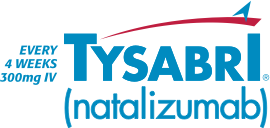AFFIRM ADVERSE REACTIONS1
| MOST COMMON ADVERSE REACTIONS IN THE AFFIRM TRIAL1 | |||
|---|---|---|---|
|
|||
|
|||
|
|||
|
|||
|
|||
|
|||
|
|||
|
|||
|
|||
|
|||
|
aInfusion reactions were defined as any event that occurred within 2 hours after the start of the infusion.
bPercentage based on female patients only.
| MOST COMMON SERIOUS ADVERSE REACTIONS IN THE AFFIRM TRIAL1 | |||
|---|---|---|---|
|
|||
|
|||
|
|||
|
|||
|
|||
|
|||
|
|||
|
|||
|
- The first cases of PML associated with TYSABRI® (natalizumab) were reported in the postmarketing setting2
